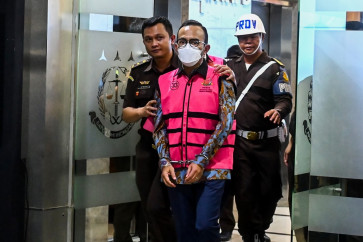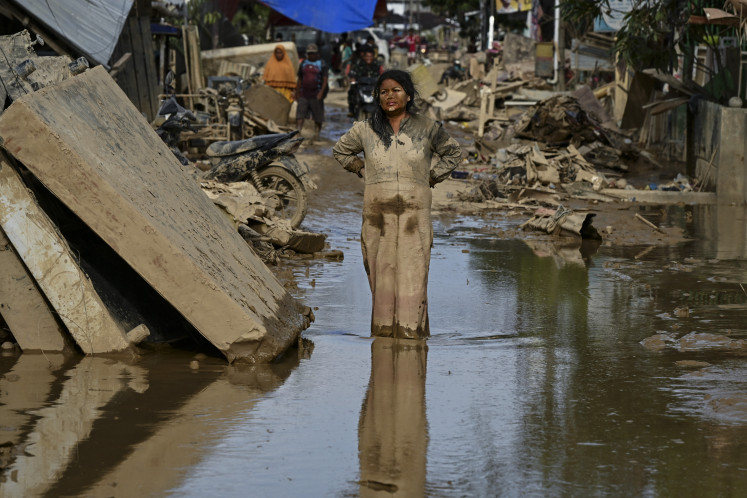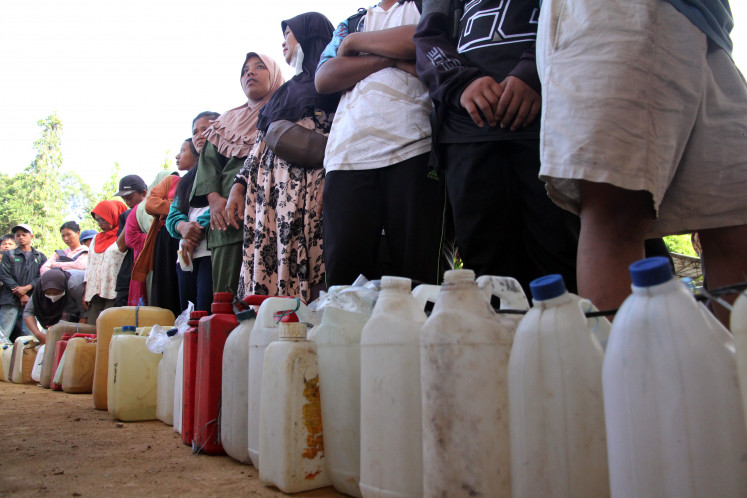Popular Reads
Top Results
Can't find what you're looking for?
View all search resultsPopular Reads
Top Results
Can't find what you're looking for?
View all search resultsA bumpy road for Prabowo despite Gerindra's rise
Since it was established in 2008, the Gerindra Party has never concealed from the public its ultimate reason for entering Indonesian politics: To pave the way for the presidential nomination of the partyâs chief patron, Prabowo Subianto
Change text size
Gift Premium Articles
to Anyone
Since it was established in 2008, the Gerindra Party has never concealed from the public its ultimate reason for entering Indonesian politics: To pave the way for the presidential nomination of the party's chief patron, Prabowo Subianto.
In its maiden election outing in 2009, however, the party only garnered 4.5 percent of the vote and finished eighth, forcing Prabowo to accept the offer from Indonesian Democratic Party of Struggle (PDI-P) chairwoman Megawati Soekarnoputri to become her running mate in the 2009 presidential election.
Supported by massive political advertising and intensive social media campaigns, both Gerindra and Prabowo have seen their popularity rise quickly in the past years. Many recent surveys, for example, have predicted that Gerindra will finish in the top three, along with the PDI-P and the Golkar Party, in the April 9 general election.
Although Gerindra might enjoy solid leverage when approaching smaller parties to support Prabowo's nomination, the odds on the retired general winning this year's presidential election have lengethened considerably since the PDI-P's decision last week to officially endorse Jakarta Governor Joko 'Jokowi' Widodo as its presidential candidate.
It has been widely reported that Prabowo and Megawati signed a political agreement prior to the 2009 presidential election, in which the latter said she would support Prabowo's presidential nomination in 2014 in exchange for his support to her presidential bid.
Prabowo is regarded as the most popular presidential candidate if Jokowi is taken out of the equation, according to various political surveys. Other surveys have also suggested that Jokowi's presidential nomination might slow the performance of other political parties, including Gerindra, in the legislative election.
A survey released in late January by the Jakarta-based Pol-Tracking Institute, for example, found that if the PDI-P announced the candidacy of Jokowi before the legislative election, the party would receive 30.78 percent of the vote, far higher than Golkar in second place with 12.34 percent, Gerindra on 6.51 percent and the ruling Democratic Party on 4.67 percent.
Law No. 42/2008 on the presidential election stipulates that only a political party, or coalition, that has garnered 20 percent of legislative seats or 25 percent of the popular vote in the legislative election is eligible to contest the presidential election.
Gerindra secretary-general Ahmad Muzani, however, said his party was upbeat about winning enough votes to support Prabowo's nomination.
'Gerindra must secure a significant number of House of Representatives seats to provide solid legislative support for the anticipated [presidential] leadership of Pak Prabowo,' he said.
Gerindra currently has 26 out of 560 House seats, with 16, or 62 percent, of them coming from Java-based electoral districts.
According to Gerindra's official history, it was Prabowo's brother Hashim Djojohadikusumo and former student activist Fadli Zon who first came up with the idea of establishing the party in late 2007 when Prabowo still served as a member of Golkar's advisory council. 'Prabowo and I, and the other [Gerindra] founders, realized that if good people refused to get involved in politics, the country's politics would be full of corrupt, villainous and evil people,' Hashim said.
Prabowo and Hashim's grandfather Margono Djojohadikusumo and father Soemitro Djojohadikusumo were among the country's founding fathers. Margono was the first chairman of the Supreme Advisory Council and founder of state-owned Bank Negara Indonesia, currently the country's fourth-largest lender. Soemitro was a prominent economist who helped former president Soeharto build the Indonesian economy during the New Order.
Having consistently promoted the so-called 'People's Economy' concept, Gerindra has extensively outlined its targets and programs in the party's 'Six National Action and Transformation Programs'. The party, for example, aims to maintain the annual economic growth rate at 7 percent or more, increase the tax revenue-to-gross domestic product (GDP) level, or tax ratio, from 12 to 16 percent, and introduce a free 12-year compulsory education program.
Political analyst Hanta Yuda, however, said he believed Gerindra's performance in the upcoming election would be largely determined by the popularity or otherwise of Prabowo.
'I think this is normal since most voters have identified Gerindra as Prabowo's party just as they consider the PDI-P as Jokowi's,' he said.










